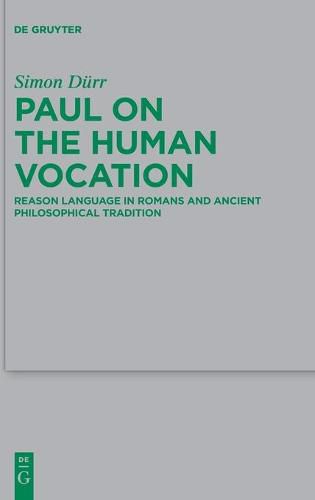Readings Newsletter
Become a Readings Member to make your shopping experience even easier.
Sign in or sign up for free!
You’re not far away from qualifying for FREE standard shipping within Australia
You’ve qualified for FREE standard shipping within Australia
The cart is loading…






This title is printed to order. This book may have been self-published. If so, we cannot guarantee the quality of the content. In the main most books will have gone through the editing process however some may not. We therefore suggest that you be aware of this before ordering this book. If in doubt check either the author or publisher’s details as we are unable to accept any returns unless they are faulty. Please contact us if you have any questions.
Paul’s use of
in Rom 12.1 has long fascinated and puzzled interpreters. This study proposes a new explanation of Paul’s reason language in Rom 12.1 based on a detailed investigation of ancient philosophical texts on the role of human beings in the cosmos, in which reason language and the idea of a vocation of human beings are closely connected. It argues that Paul here appeals to the idea of a human vocation in order to claim that Christ-followers are able to fulfil their human vocation by living in such a way that their lives produce signs of the new creation inaugurated in Christ. This case is made by establishing the central role of reason in ancient discourse on what it means to be human more broadly, and in particular in Epictetus, who provides the clearest parallel for Romans. These contextualisations allow for a fresh reading of Paul’s argument in Romans, where the relevance of these traditions is shown, not least for how Rom 12.1-2 frames Rom 12-15. The study thus contributes to the recent scholarly trend of exploring Paul in ancient philosophical contexts and advances the discussion on the integration of Paul’s theology and ethics within an ancient cultural encyclopedia.
$9.00 standard shipping within Australia
FREE standard shipping within Australia for orders over $100.00
Express & International shipping calculated at checkout
This title is printed to order. This book may have been self-published. If so, we cannot guarantee the quality of the content. In the main most books will have gone through the editing process however some may not. We therefore suggest that you be aware of this before ordering this book. If in doubt check either the author or publisher’s details as we are unable to accept any returns unless they are faulty. Please contact us if you have any questions.
Paul’s use of
in Rom 12.1 has long fascinated and puzzled interpreters. This study proposes a new explanation of Paul’s reason language in Rom 12.1 based on a detailed investigation of ancient philosophical texts on the role of human beings in the cosmos, in which reason language and the idea of a vocation of human beings are closely connected. It argues that Paul here appeals to the idea of a human vocation in order to claim that Christ-followers are able to fulfil their human vocation by living in such a way that their lives produce signs of the new creation inaugurated in Christ. This case is made by establishing the central role of reason in ancient discourse on what it means to be human more broadly, and in particular in Epictetus, who provides the clearest parallel for Romans. These contextualisations allow for a fresh reading of Paul’s argument in Romans, where the relevance of these traditions is shown, not least for how Rom 12.1-2 frames Rom 12-15. The study thus contributes to the recent scholarly trend of exploring Paul in ancient philosophical contexts and advances the discussion on the integration of Paul’s theology and ethics within an ancient cultural encyclopedia.